Late fall through early winter is show season in Japan. Depending on how many trees a bonsai professional has to show – or sell – October through February can be a busy time. Within just three weeks, I helped with trees bound for four different events. Show preparation can entail anything from needle plucking to repotting to detail wiring. And once show trees are ready to go, work begins on the sale trees.
My favorite task during the season is show wiring. On several occasions, I’ve been given a tree and told to make it look pretty without using heavy wires. Depending on the tree, this can be a confounding task. The first tree I worked on was a cascade black pine.

Japanese black pine
After removing old needles and trimming a few long needles, I began tweaking the branches, most of which were wired last year. I quickly realized I didn’t have a great idea of what I was trying to do so I let Mr. Tanaka complete the work on the tree. When the branches were set, I oiled the pot and applied moss to the surface of the soil. Here’s a photo of the finished tree.
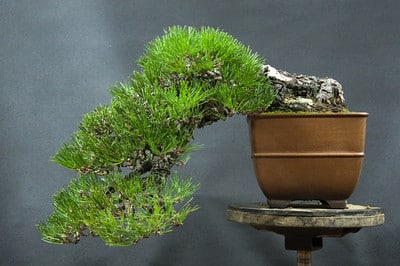
Japanese black pine – show prep complete
The next tree I worked on was a large black pine with long needles. The tree was in good shape, but stray needles and branch pads that lacked definition detracted from the overall look of the tree.
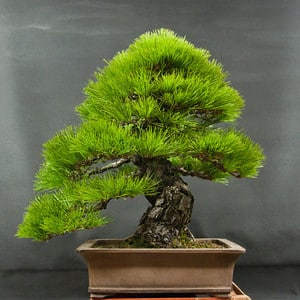
Black pine – before
I began by removing needles that grew at undesirable angles – usually downward – and wiring a number of small branches to better define key branch pads. When I finished, I had Mr. Tanaka take a look.
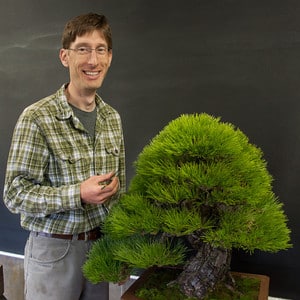
Happy with the result
Tanaka tweaked a few small branches and added a guy wire – for the most part, subtle changes. Here’s how the tree ended up.
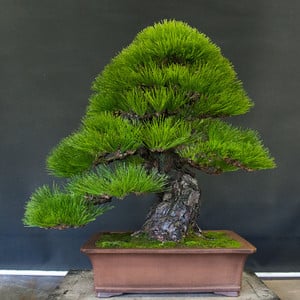
Show prep complete
Sometimes simple tasks can make a big difference. The deadwood on the white pine below was quite dark before I treated it with lime-sulfur.
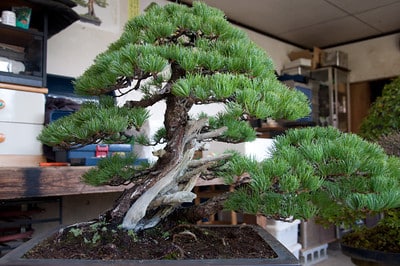
White pine with lots of deadwood
I also plucked stray needles from a large white pine bound for Taikan-ten.
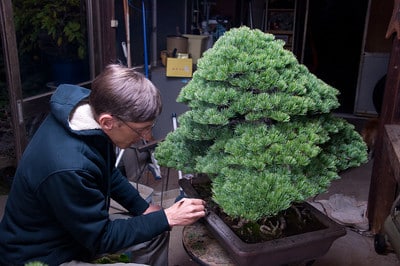
Needles plucked – getting ready to add moss
On the other end of the spectrum, some trees were wired from bottom to top. This isn’t normally done just before an exhibition, especially ahead of shows like Kokufu and Taikan-ten. The practice can, however, be acceptable for regional shows – especially if the tree’s owner requests it.
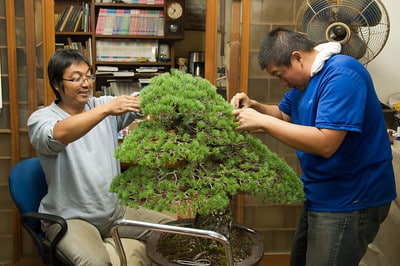
Mr. Tanaka and Peter Tea working late to finish wiring a large white pine
The show prep that really caught my attention was the work that went into an old multi-trunk trident maple. The first step involved removing all of the leaves.
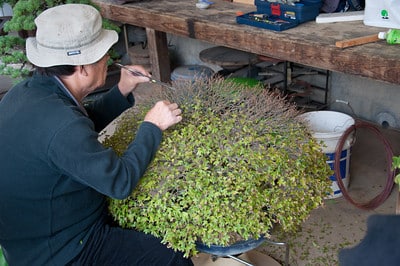
Mr. Tanaka removing old leaves
I would have thought this job wouldn’t take a long time, but when there are hundreds of leaves on hundreds of branches and great care must be taken to avoid breaking branches, the task can take a surprisingly long time. It’s a perfect job for Mr. Tanaka, a third-year apprentice at Aichi-en who by coincidence has the same name as our oyakata.
Once the leaves were removed, Mr. Tanaka pulled out an electronic toothbrush and scrubbed the branches with water to remove green build-up wherever it appeared.
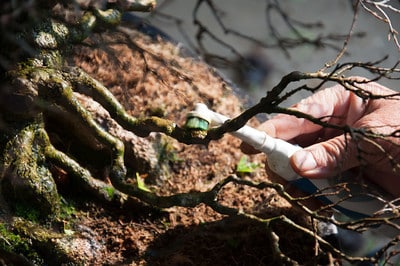
Electric toothbrush technique
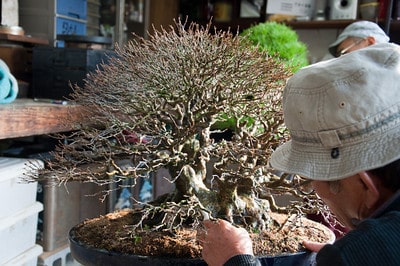
So many branches
The result was a beautiful trident maple. Some moss and an oiled pot completed the work, and the tree looked great at Taikan-ten. I’ll post pics of these trees as exhibited before long.
Subscribe to Bonsai Tonight
New Posts Delivered Every Tuesday and Friday
Mac says
You mention oiling a pot. What did you use? Mineral oil or something else?
xwires says
Different gardens use different oil. Some use vegetable oil, others use camelia oil. Haven’t seen anyone use mineral oil yet.
bonsaijapan says
It looks like you are having a great time over there Jonas, i am really enjoying your posts.
Joe.
keisen says
Large black pine transformed beautiful into show mode. Thank you for shariing
LeeBee says
I cant believe neither I or my friends never thought of an electric toothbrush. This one post has saved me countless future hours. Thank You